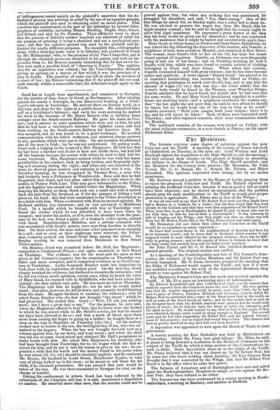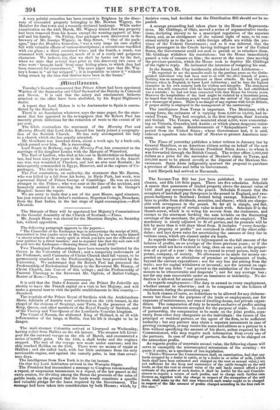ight ifirobintes.
The farmers continue some degree of agitation against the new Corn-law and the Tariff. A meeting of the county of Essex was held at Chelmsford, on Tuesday, in the open air. Lord Western and Lord Rayleigh signed the requisition to the High Sheriff to call the meeting ; but they excused their absence on the ground of fatigue in attending the debates in the House of Lords. The High Sheriff presided; and the Members for the County were present—Mr. Bramston, Sir John Tyrrel, Mr. C. G. Round, Mr. J. Round, Mr. ,nd Major Beresford. The opinions expressed were strong, but by no means unanimous.
Mr. Bawtrey moved a petition to the House of Lords, Praying them to reject the proposed Corn-law and Tariff. Mr. Tufnell objected to refusing the proffered Corn-law, because it was as good a bill as could have been expected; and he moved an amendment, that the petition should pray for such modifications in the Tariff as would give proper protection to agriculture. Mr. Elmes was in fear of the Whigs— It was all very well to say that if Sir Robert Peel went out they might have had a Stanley or a Graham for a leader ; but did they forget that they were already in the Cabinet, and that they were firm supporters of Sir Robert Peel? Then, were they to go to Buckiugham, he should be glad to know who was to act with him, or how he was to form a Government ? it was nonsense to talk of keeping out the Whigs ; and they might rely that no choice was left them but Sir Robert Peel's bill or the Whig Government and total repeal. Mr. Brarnston did not think that either the Corn-law or the Tariff would be so injurious as many expected— He knew that several farms in the neighbourhood of Ipswich had been let at an increased rental ; and he knew that in Scotland, which country it was supposed would be most affected by the proposed measure, there was no diffi- culty in getting tenants ; and in the county of Clare, in Ireland, he knew that one large estate had recently been sold for thirty years' purchase. Sir John Tyrrel and Mr. C. G. Round also justified themselves on general grounds. The original motion was carried.
At a meeting of the Cambridgeshire and Isle of Ely Farmer's Asso- ciation, the conduct of the County Members and Sir Robert Peel was fiercely impugned. Mr. S. Jonas, however, promised the meeting, that the Duke of Richmond would oppose the Tariff; and that if it were not modified according to the wish of the Agricultural Members, they meant to vote against Sir Robert Peel, The Maidstone Farmer's Club met last week and resolved against the Tariff. A Mr. Elvy gave' an interesting piece of information— Sir Edward Knatchbull said that 7,000 head of cattle was the utmost that could be expected from the Continent under the new Tariff. His own opinion was, that the number imported would be much more than 7,000; for he had seen in parts of France, Flanders, Holland, and Germany, (and he defied Sir Robert Peel to contradict him,) some of the finest grass land in the world, as well as some of the finest breeds of cattle ; and he was certain that as soon as the foreigner knew that the British markets were open to him he would send plenty of stock; for he had the land, the breed of cattle, the enterprise, and the spirit to do it. Ile would venture to say, that in four or five years, if they were admitted, foreign cattle would be cheap enough in England. For several years past he had been supporting Sir Robert Peel and the present Govern- ment of this country; but he hoped God would forgive him. The farmers had been as greatly deceived as any men had ever been deceived.
A deputation was appointed to wait upon the Board of Trade to state grievances.
A county meeting for East Berkshire was held at Maidenhead on Wednesday. Hither Mr. Pusey bore glad tidings : Mr. Miles, he said, is about to bring forward a resolution in the House of Commons on the subject of the Tariff, by which a large section of the Conservatives in- tend to abide. Some speculation arose as to the origin of the Tariff: Mr. Pusey believed that it was not drawn up by Sir Robert Peel, but by some one who knew nothing about farming ; Sir East Clayton East thought that it was concocted by the Whigs, and that Sir Robert Peel found it in the office when he came into power.
The farmers of Aylesbury and of Buckingham have met and called upon the Buckinghamshire Members to resign, or vote against Sir Ro- bert Peel: they have refused to do either.
The Income-tax has been condemned by a county meeting in North- umberland, a meeting at Banbury, and another at Driffield. A very painful sensation has been created in Brighton by the disco- very of concealed property belonging to Mr. Newton Wigney, the Member for that town and a recently-declared bankrupt. While under examination on the 24th March, Mr. Wigney denied that any property had been removed from his house except the wearing-apparel of him- self and his family. On Friday, four packages were discovered in the brewery of Mr. George Wigney, in Ship Street. "One of the pack- ages," says the Brighton Guardian, "was a very large tin case stuffed full with valuable effects of various descriptions ; a second ease was filled with cut glass ; a third contained wine; and the fourth, a trunk, was crammed with wearing-apparel, much of it of a costly and gorgeous character. We believe, too, that we shall be borne out by the fact, when we state that several days prior to this discovery two cases of wine were brought back' from some hiding-place, to which they had been removed for concealment." The same paper says that Mr. Wig- ney's house is "all but stripped"; it is impossible to enter it "without being struck by the idea that thieves have been in the house."



























 Previous page
Previous page